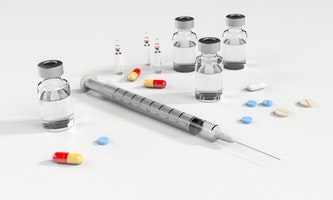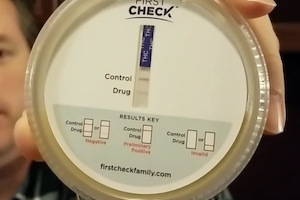Is CBD Addictive

Many people are interested in trying CBD for its many health benefits. But before most people are willing to take a new chemical into their body they want to understand the risks. Among the many questions people often seek answers to is whether or not CBD is addictive.
Is CBD physically addictive? Because CBD is not a mind-altering, psychoactive drug and your body does not produce a tolerance to it, CBD is not physically addictive. In this way, it is much like ibuprofen or acetaminophen which are common over-the-counter medications.
However, if you or someone you know is prone to becoming psychologically dependent, even normally harmless medications like these can lead to addictive behaviors.
Why CBD is not capable of causing physical addiction
 This section is specifically talking about CBD itself. In short, CBD is not capable of stimulating the brain’s reward center and is therefore incapable of triggering a physical dependence. CBD actually has very limited activity in the brain and has no effect on the pleasure center of the brain. Someone who has taken CBD for years would have no problem stopping the drug other than the possible re-occurrence of whatever symptoms caused them to start taking CBD in the first place.
This section is specifically talking about CBD itself. In short, CBD is not capable of stimulating the brain’s reward center and is therefore incapable of triggering a physical dependence. CBD actually has very limited activity in the brain and has no effect on the pleasure center of the brain. Someone who has taken CBD for years would have no problem stopping the drug other than the possible re-occurrence of whatever symptoms caused them to start taking CBD in the first place.
Even the World Health Organization (WHO) stated in a report in November 2017 that CBD, unlike THC, does not exhibit any tendency towards abuse or chemical dependency. In other words, in all the studies reviewed for this WHO report, none of them suggested CBD could lead to a physical addiction. This is great news for anyone interested in trying CBD but leery of becoming addicted.
What are the symptoms of physical dependence
 When we speak of addiction we are really speaking of two types of addiction. The first we’ll cover is a physical addiction. This type of addiction is characterized by:
When we speak of addiction we are really speaking of two types of addiction. The first we’ll cover is a physical addiction. This type of addiction is characterized by:
- A compulsive use of a particular drug despite harmful consequences
- Inability to stop using a drug
- Inability to meet the regular demands of family, work, and social norms
- Development of a tolerance to certain drugs (requiring more of the drug in order to get the same effect)
- Difficult withdrawal symptoms as the concentration of the drug in the body begins to go down.
What causes a chemical to become addictive
In order for a chemical to lead to a physical addiction it needs to be mind altering. Most addictive substances stimulate the dopamine-based reward center of the brain. The stimulation causes an artificially high amount of dopamine, the so-called “pleasure hormone”, to be released at one time. These elevated levels of dopamine create a temporary feeling of euphoria or a “high”.
In addition, the body typically builds a tolerance for these types of drugs. Tolerance means that the body requires more and more of the drug each time it’s used in order to achieve the same level of “high” as the previous usage.
As an example, a very common chemical that can lead to physical addiction is caffeine. Caffeine actually causes a release of dopamine in the brain which promotes increased alertness. A person who has consumed caffeinated beverages for years and then all of a sudden stops consuming them often suffers from withdrawal symptoms such as headaches, tiredness, irritability, and others. For more information ask anyone you know who has tried to stop drinking their favorite caffeinated drink after years of consuming it!
What is a psychological addiction
The second form of addiction is a psychological addiction. This addiction may be accompanied by similar outward symptoms as physical addiction, however, the addiction is mental rather than physical. The person has a very strong mental desire for a particular substance. This type of addiction is usually genetic in nature. Meaning the person has a biological predisposition to becoming mentally addicted to something.
For a person prone to this type of addiction, any substance, no matter how innocent, may become addictive. It may be very difficult for a person who isn’t predisposed to this type of addiction to relate to these types of people but it is a real issue for many people. In our answer above we said that CBD is not a physically addictive substance which is true. However, it is entirely possible for a person who suffers from a psychological addictive personality to become mentally addicted to it as with just about any other substance.
THC could lead to a physical addiction
THC is one of the many chemicals found in marijuana. It is the psychoactive chemical in marijuana responsible for getting you “high”. The same WHO report referenced above also explained why THC could lend itself to addiction. The report confirmed that almost all drugs prone to abuse and addiction stimulate the pleasure center of the brain to release unusually high levels of dopamine. It then states that THC has been shown to stimulate this same process.
Many people will tell you that THC is not addictive. And it may not be highly physically addictive. But the fact that it is a known psychoactive chemical that increases the release of dopamine in the pleasure center of the brain, just like every other physically addictive drug does, suggests that it most likely can become physically addictive after prolonged exposure to it.
CBD from Hemp is the safest option for avoiding addiction
Given the information presented above, it is my opinion that the safest way to benefit from CBD without the risk of becoming chemically dependent to THC is to use CBD oil obtained from Hemp. Hemp CBD oil contains less than 0.3% THC which is well below the amount needed to have any impact on the pleasure center of the brain, resulting in any sort of “high”.
CBD oil from marijuana may have significant levels of THC. These levels could certainly be high enough to cause a “high” and over time could lead to physical dependence on the product. And since CBD is the same whether it’s derived from Hemp or marijuana, it is my opinion that there is no reason to risk becoming physically dependent on THC by using the marijuana version of CBD oil.
Related Questions
Resources for help with addiction
If you or someone you know has become addicted, either physically or psychologically, to a drug, there are resources available to help. It’s likely resources exist in your local community, but below are some additional resources to help you get started:
- National Helpline: The SAMHSA (Substance Abuse and Mental Health Services Administration) National Helpline is a free, confidential, 24/7, 365-days-a-year treatment referral and information service (in English and Spanish) for individuals and families facing mental and/or substance use disorders.
- American Addiction Centers: This helpful website can help you find local rehab centers. They can even help connect you with free rehab options if you don’t have the money to pay for high price rehab centers.
We hope you’ll take advantage of these helpful resources listed above. Addiction is nothing to be ashamed of or anything to try and run from. The only course of action that will help you overcome your addiction is to get professional help. You can overcome your addiction and return to a normal level of health and well being as you make a strong effort and take the proper actions. The first action is to get professional help!


